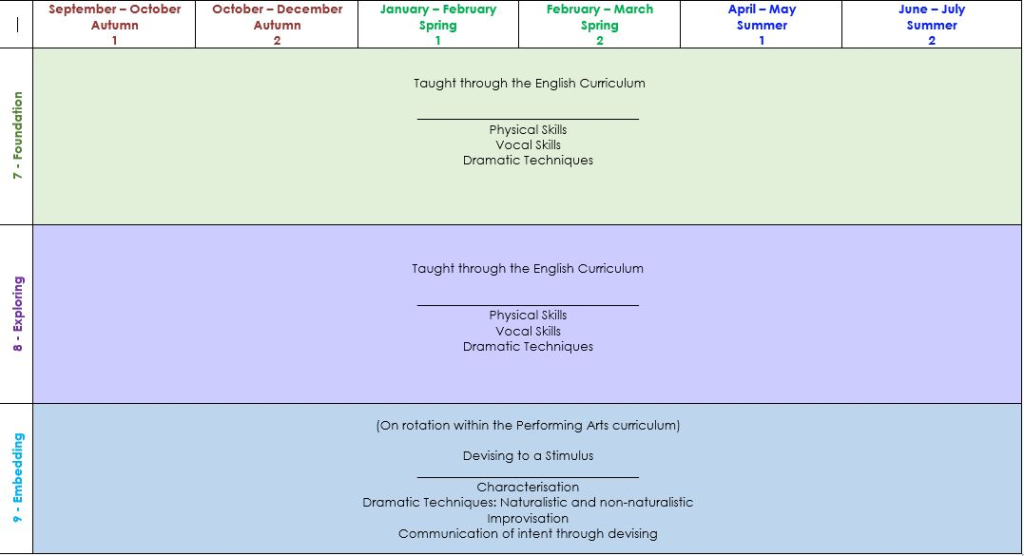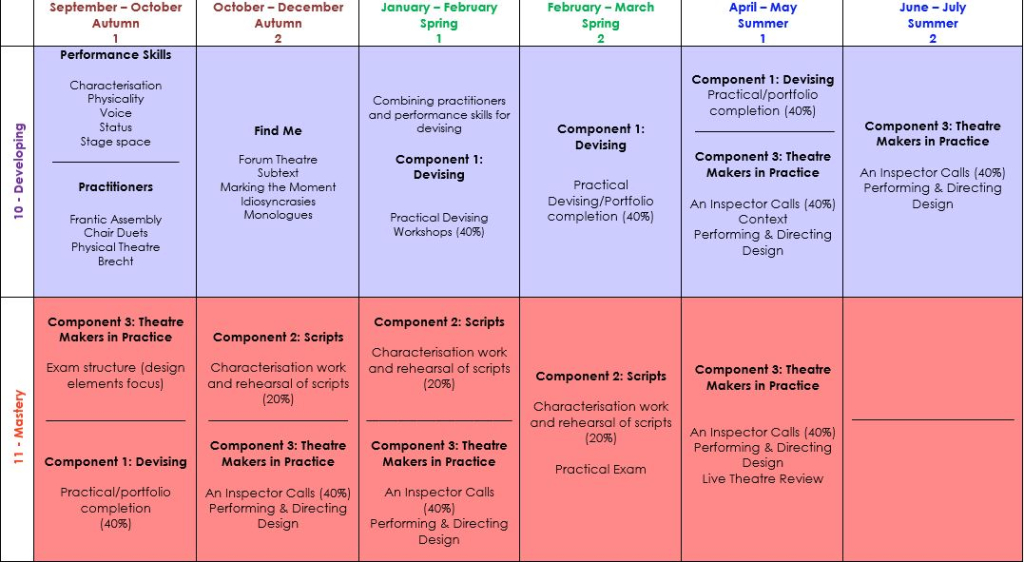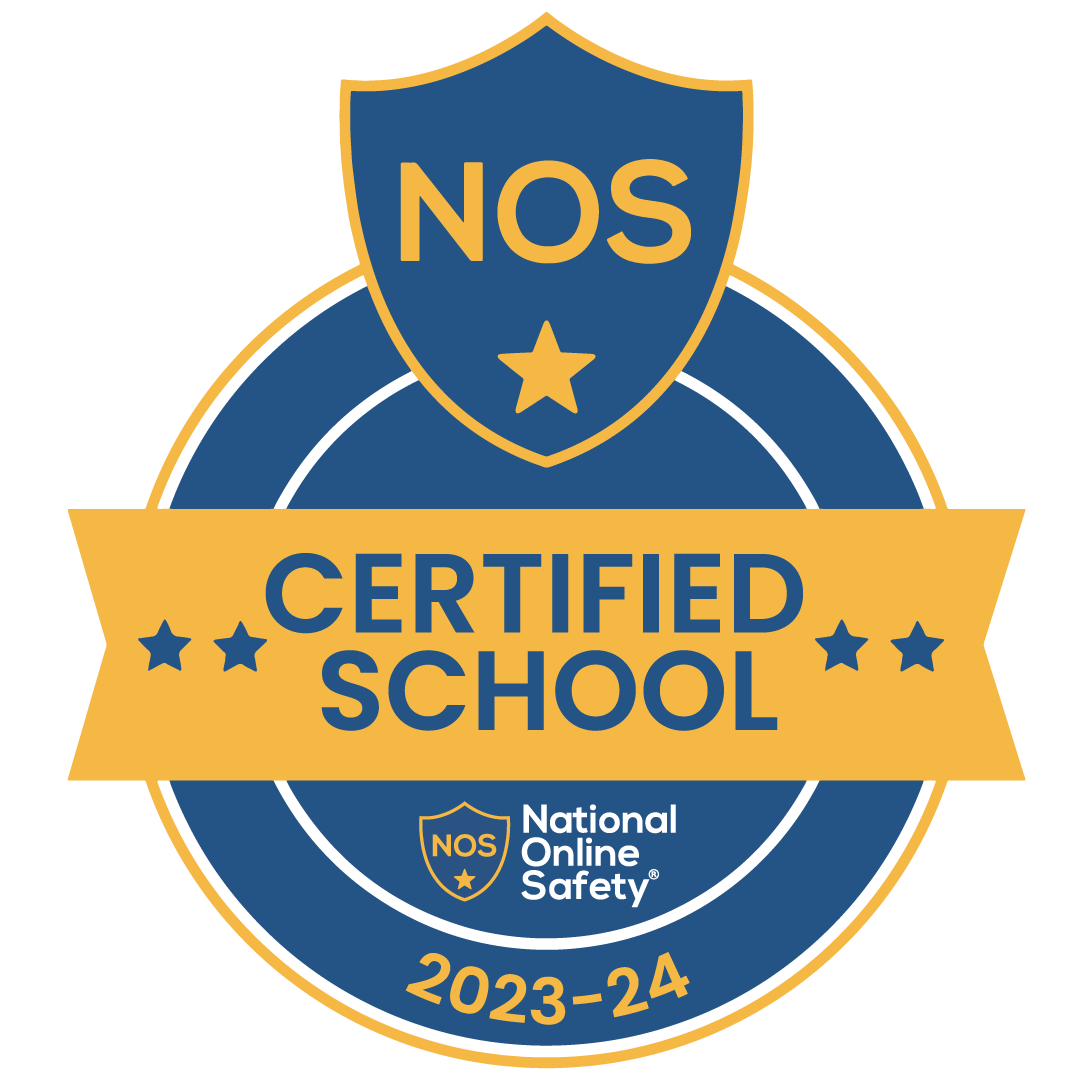Drama
Department Staffing & Roles
Miss R May – Associate Assistant Principal – Behaviour
English Department Staff
General Subject Overview
“Like theatre, Drama in schools can unlock the use of imagination, intellect, empathy and courage. Through it, ideas, responses and feelings can be expressed and communicated. It carries the potential to challenge, to question and to bring about change.”
In the Drama department, students create, perform and respond to a number of stimuli, plays and topics in order to develop their communication, creativity, confidence and skills. We develop pupils’ independence, creativity and team-work. There is an emphasis on communicating and working as part of a group in order to develop skills and their drama technique. Throughout the course students experience and develop a range of drama techniques, skills and genres, as well as acquiring numerous employability skills for the future.
KS3 (Years 7-9)
Year 7
In Year 7 students are introduced to the subject of drama and will learn essential performance skills and drama techniques throughout the year. Students will use their knowledge of these techniques as we move through the course to devise their own pieces of drama based on a number of different stimulus. We will also explore drama texts within schemes, in which students will create characters and use drama techniques to explore a script. Students also undertake a musical theatre unit in which they will explore characterisation and acting for a musical.
Year 8
Students extend and enhance skills learnt in Year 7 throughout the year. We will continue to develop the techniques learnt as we explore and variety of stimulus. We will study units of work which exploring different genres, including horror and comedy, as well as studying real life events such as Rosa Parks, and a script towards the end of the year. During the course in Year 8 students will start to explore lighting and sound design and use these technical theatre elements alongside their practical work.
Year 9
Year 9 provides an opportunity to embed skills learnt in Years 7 and 8. Drama is delivered through the Performing Arts rotation in Year 9 alongside dance, music and musical theatre. In Drama, students will develop their performance and characterisation skills. Students perform scripted and devised work, working in groups, pairs and on their own. Students are encouraged to be creative, imaginative and express their own opinion on the given stimuli when devising and evaluation performances.
KS4 (Years 10-11)
Year 10
During Year 10 students’ study ‘An Inspector Calls’ as the set text for the C3 exam. They will also explore the first unit of the GCSE exam – devising. Students will use a stimulus to devise a piece of drama. They will use research, drama strategies and techniques to explore the stimulus before creating a piece of drama in a group ready for performance. Throughout the unit students will develop skills such as voice, physicality, characterisation and communication with other actors. Students will produce a portfolio alongside the practical performance which will include initial responses to the stimulus, the rehearsal process and analysis of the piece devised.
Year 11
The first part of Year 11 will see the students focus on the second unit of the exam. Students will perform two extracts from a text for a live audience and examiner. Students will develop knowledge and understanding of the text and rehearse two key extracts for the final performance. Students will use skills such as characterisation, vocals and physicality to interpret the text and create a character for performance. Students will also undertake a written exam in Year 11. The exam is split into two parts, the study of a performance text and a live theatre evaluation.
KS3 Overview (Years 7-9)

KS4 Overview (Years 10 and 11)
Edexcel GCSE Drama:

The Gatsby Benchmarks
| Gatsby Benchmark | How we will meet this: |
| 1: A Stable Careers Programme | ¨ Annual theatre trips to introduce a vast range of careers through the industry.¨ Trips to take part in performances within a theatre setting – this enables students to experience specific careers e.g. performer, staging director, lighting director. |
| 2: Learning from Career and Labour Market Information | ¨ LIPA attend the careers fairs for Y8 and Y11 Careers Fairs.¨ During parents evening and options evening, information is provided to students and parents regarding future career opportunities in Drama. |
| 3: Addressing the Needs of Each Pupil | ¨ Specific advice and guidance given to students at parents and options evenings.¨ Year 11 students given advice through Academic Mentors and subject teachers. |
| 4: Linking Curriculum Learning to Careers | ¨ In both KS3 and KS4 SOL, references to careers are made and linked to certain topics across the curriculum.¨ In the GCSE Drama spec studied at KS4, students can opt for designing elements which link directly to design based careers within the Performing Arts industry.¨ Component 3 exam in year 11 offers questions that ask students to work as a performer, director and a designer. This gives students a real insight into the different career opportunities available in the Performing Arts industry. |
| 5: Encounters with Employers and Employees | ¨ LIPA summer school offered to KS4 students through audition, this gives an insight into the careers and opportunities through Performing Arts.¨ Workshops and Career talks with professional artists. |
| 6: Experiences of Workplaces | ¨ Work experience at LIPA and other Performing Arts instititons to encourage students to enter this industry.¨ Visits to LIPA and the Shakespeare Schools Festival to experience the workplace. |
| 7: Encounters with Further and Higher Education | ¨ Workshops in lessons with Y8 by LIPA that includes a discussion of courses available.¨ Campus visits to Post 16 colleges and universities specific to Drama i.e. Cronton and LIPA¨ Taster day Drama Workshops at Cronton College |
| 8: Personal Guidance | ¨ Auditions, shows and rehearsals which mirrors interviews/auditions in the Drama industry.¨ Students are able to receive careers advice from subject teachers, academic mentors and careers advisor. |
Further and Higher Education
There are a range of courses available in both higher and further education which allow students to progress into the Dance Industry, including:
- A Level Drama
- BTEC Level 3
- Higher National Diploma
- BA Hons Degrees
- Post Graduate and Masters Degrees
Career Links
There are a wide range of career options available to dance students both inside and outside the industry including:
- Actor
- Director
- Stage Manager
- Events Management
- Teaching
- Teaching Assistant
- Community Drama
- Marketing
- Drama Therapist
- Journalist
- Critic
- Speech Writer
- Author
- Playwright
- Screenplay Writer
- Festival Co-ordinator
- Lighting Designer
- Sound Designer
- Set Designer
- Producer
- Police Officer
- Box Office
- Electrician
- Customer Service
- Theatre in Education
- Theatre Company
- Choreographer
- Technician
- Carpenter
- Fashion Design
- Costume Designer
- Wardrobe – Costumes / Wigs
- Hair / Make Up Artist
- Media Make Up / SFX
- Lighting Programmer
- Cameraman
- News Reporter
- Projection Designer
- Youth Worker
- School Productions – students can get involved both on and off stage and students from all Years are invited to participate.
- Drama club – this provides an opportunity for students to develop performance skills further and participate in performances.
- Workshops – chances inside and outside of school to enhance and develop acting and performance skills.
- Theatre Trips – students go to a variety of theatres to watch live theatre and review it as part of their studies.
- Intervention – students in year 10 and year 11 can participate in intervention sessions as extra revision and support for their GCSE course.
KS3
Brecht: https://www.bbc.co.uk/bitesize/guides
Musical Theatre: https://www.bbc.co.uk/bitesize/guides/
Naturalism: https://www.bbc.co.uk/bitesize/guides/
Physical Theatre: https://www.bbc.co.uk/bitesize
KS4
Devising – Theatre in Education: https://www.bbc.co.uk
Devising – https://www.bbc.co.uk/
Understanding Drama & Theatre – https://www.bbc.co.uk
Performing as a Character – https://www.bbc.co.uk
Theatre Design – https://www.bbc.co.uk/
Scripted Drama – https://www.bbc.co.uk
Written Exam – https://www.bbc.co.uk/
KS4 Revision Guides:
- GCSE Edexcel Drama Revision Guide – https://www.amazon.co.uk/
- GCSE Edexcel Drama Revision Workbook – https://www.amazon.co.uk
- GCSE Drama ‘An Inspector Calls’ – https://www.amazon.co.uk/
- ‘An Inspector Calls’ – https://www.amazon.co.uk
Theatre Trips
Students attend a variety of theatres, (local, college and regional) to watch live theatre and use this as part of their learning. Previous trips have included visits to see:
- Wicked – Liverpool Empire
- The Mouse Trap – Manchester Opera House
- Curious Incident of the Dog in the Night-time – Liverpool Empire
Workshops
- Students take part in a variety of workshops delivered by LIPA.
- Students are provided with numerous opportunities to participate in workshops with professional artists.
Schemes of Learning
- Students participate in a number of schemes of learning which are relevant to today’s culture and society and allow for learning about the world around us and outside of drama.


